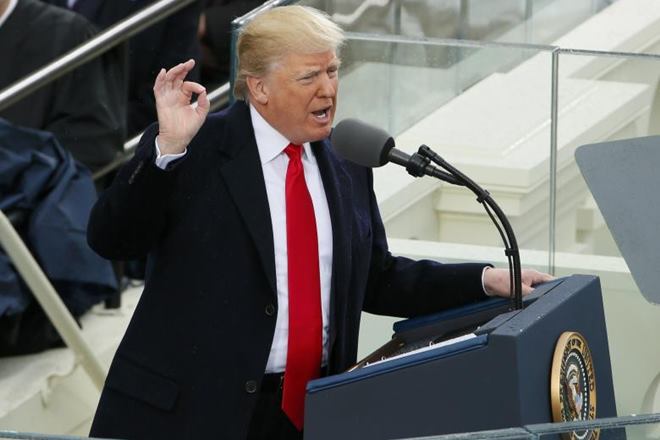Donald Trump effect on GST: US businesses in India may get impacted
The Financial Express
By Amitendu Palit
January 25, 2017 5:54 AM
The GST combined with Trump’s economic policies might impact the cost competitiveness of US businesses in India

US President Donald Trump. (Reuters)
As the world waits for Donald Trump to get going as the 45th president of the US, there’s great attention on the changes his administration is likely to introduce in the US trade policies. Most of these changes will have far-reaching impact on the prospects of bilateral trade between various countries and the US. Some of the changes might impact India and can extend to the prospects of India’s impending Goods and Services tax (GST).
Trump wants US businesses to produce from home rather than from overseas. He has specifically targeted automobile manufacturers in this regard. Trump would like US automakers like Ford and General Motors to assemble vehicles in the US, rather than from facilities in Mexico or other foreign countries and export them to the US, as they often do now. He has also urged German and Japanese automakers such as BMW, Mercedes Benz and Toyota to do likewise. Indeed, automakers and other US manufacturers currently manufacturing overseas and exporting to the US are likely to face high customs duties on their exports if the Trump administration is serious in implementing the threat.
Trump also plans to reduce corporate income taxes for making manufacturing from the US a more attractive option for American and global businesses. He might also impose a tax on the US companies that outsource services. All these policies are part of his plans to protect existing American jobs and create new ones. This was one of the central themes of his electoral campaign. American workers who lost their jobs from the relocation of US businesses to Mexico and other parts of the world have supported Trump wholeheartedly. For Trump, it is now ‘payback time’.
High customs duties on exports to the US and lower corporate income taxes will create disincentives for American companies that are manufacturing overseas. These include American companies producing from India. The new fiscal policies can adversely impact the participation of US companies in the Make-in-India initiative. Several prominent US companies are already producing or have plans for producing from India. Ford has several manufacturing facilities in India from where it assembles and exports vehicles. Apple is expected to begin assembling iPhones in India from later this year. Major aircraft manufacturers like Lockheed Martin and Boeing have also committed to investing in India. Trump’s policies can make India a less attractive location for all these companies. It can make India similarly less attractive in the supply-chain visions of other foreign investors that service the US market as a destination for their final products from India.
American companies from India that are likely to face high customs duties on their exports to the US would be worried over retaining their cost advantages. This might lead them to lobby with the Indian government for concessions. The most likely concessions they would demand are payment from indirect taxes. Exporters from India are currently exempted from paying several indirect taxes. These include the value added tax (VAT), sales tax and central excise. The Duty Drawback facility allows exporters to claim refunds on central excise and customs duties paid on raw materials and other inputs used in exports. Exporters are also not required to pay customs duties on import of several capital goods and essential inputs for exports under various incentive schemes of the government of India.
The introduction of the GST in India will change the scenario. The GST will replace multiple indirect taxes like the central excise, sales tax, VAT and service tax by a single consolidated tax. The consolidation will bring to an end the exemptions associated with various taxes for exporters. As of now, it appears that exporters will first have to pay the GST on all raw materials, inputs and other services they source domestically for their exports and later claim refunds. This would imply greater expenditures for exporters since refunds will materialise only after several months. For US companies exporting back to the US, this might mean incurring more costs, both in producing in India as well as in exporting to the US through higher customs duties.
The advent of the GST combined with Trump’s economic policies for discouraging imports might impact cost competitiveness of US businesses in India, forcing them to lobby hard for seeking exemptions from upfront payment of GST. Apple’s demands for tax concessions, for example, which are now on exemption of customs duties on imported components required for assembling IPhone, might expand to include upfront exemption from GST. This would increase the complications and challenges of administering the GST in India since the GST is likely to be implemented on a non-exemption principle. Donald Trump and his trade policies were certainly not among the ‘shocks’ that the GST planners had accounted for!